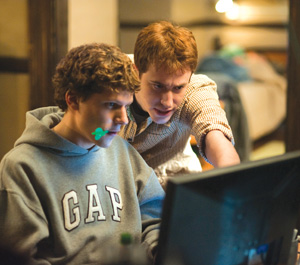
LET’S LEAVE aside the social problem of Facebook as a privacy violator. I’m not up to the depths of tireless radio investigator Dave Emory, who reached for his Foucault when titling a recent communiqué “In Your Facebook: A Virtual Panopticon?”
The time-wasting phenomenon does have its therapeutic side, however; no more lying awake at 4am wondering if that certain someone will ever forgive you for drunkenly declaring eternal love and then throwing up in the hydrangeas back in 1996. And the real-life Mark Zuckerberg couldn’t possibly be as chilly as his namesake, the antagonist of David Fincher’s The Social Network. This is a fiendishly clever and funny movie about the creation of the Internet monster. The cry “The site’s alive!” is certainly meant to echo Dr. Frankenstein’s shout when he first saw his creature twitch.
As Zuckerberg, Jesse Eisenberg gives a master class on recessive acting: he’s beady eyed and covert, with the occasional pit-viper-like sway of a truculent, lowered forehead. People who saw Eisenberg in The Squid and the Whale know how bravely he stripped out what’s called “youthful idealism” from his lead role. Eisenberg amplifies the quality he showed us then, without distorting it at all. His Zuckerberg embodies the kind of remorseless superiority that always looks comically childish and wounded. He becomes the kind of CEO who thinks that it’s killing wit to put an obscenity on his calling card.
Fincher makes this story of betrayal glide along between the narrows of beautifully balanced flashbacks. The film shuttles back and forth from the present-day deposition of the now arrogantly rich Zuckerberg, being sued by a quartet of burned partners (among them his former best friend Eduardo, played by Andrew Garfield).
Facebook has its origins in the dorms of Harvard in 2003. The young Mark decides, one drunken night, to get revenge on a girl who spurned him. First, he denounces the smallness of her tits on his blog; then he hacks into the computer “facebooks” of the various houses at the university, to create an online game of rate-the-hotties. The hacking gets him suspended for six months. None of Zuckerberg’s defenses work, neither the public-spirit excuse—”I believe I pointed out some gaping holes in the security of your system”—nor the youthful-high-jinks excuse—”Don’t you have a sense of humor?”
The incident attracts the interest of a pair of Porcellians: wealthy twin WASPs called the Winklevosses (played by a digitally duplicated Armie Hammer), who want to finance a new kind of social networking tool.
Zuckerberg devises Facebook as we know it: a way to discern the singleness or availability of another person, a method to distribute trivia and chat with friends. Fincher works very creatively around the visual problem of showing a solitary man tapping at the computer. This means an extravagant (if extraneous) passage about a sculling competition in England, marvelously made to look like an antique tabletop model come to life.
The mole-person Mark forecasts a scary future: “We lived on farms, and we’ve lived in cities, and now we’re going to live online!” This prediction comes before he learns a more pleasant use of power. He meets the founder of Napster, Sean Parker (played by Justin Timberlake as a happy wastrel). Parker lures Zuckerberg West into everything California represents: girls, drugs, drinking margaritas out of pint beer glasses and ziplining from a roof into a swimming pool.
The Trent Reznor and Atticus Ross music here seems more like the sinister David Byrne and Eno we loved, than the flowery, love-struck Byrne and Eno in Wall Street: Money Never Sleeps. A little touch of “Hall of the Mountain King” recalls Fritz Lang. The music is turned up for the scene when evil goes mega; the camera makes its own zipline ride through a Ruby Skyeish San Francisco nightclub, to zero in on Parker’s face, flashing every diabolical color from the club’s lights. This is one mere touch of the taste and intelligence of Fincher regular cinematographer Jeff Cronenweth, who keeps us oriented by making the walnut-lined tombs of Harvard so different from the lambency of the sun in Palo Alto.
The film is almost an all-male world, though some small room has been carved out for women: Rashida Jones is the moral center, a voir dire expert at the legal firm deposing Zuckerberg.
Aaron Sorkin’s wild, witty script hands out some punishment that goes beyond the financial: this Zuckerberg, like Jay Gatsby and Charles F. Kane, is cut off from what he most wanted in life. It probably only works that way in fiction. But The Social Network, a comedy in the Balzac sense, is a balancing act; the mockery and disgust of greed match the essential lightness of the situation. It’s only Facebook, after all.
The Social Network
PG-13; 120 min.


